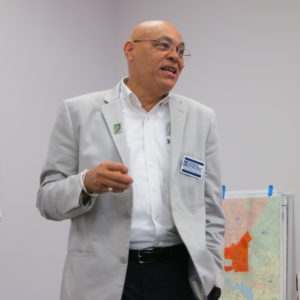Today, on Martin Luther King, Jr. Day, Akili, a senior project coordinator with Corporate Accountability International, is receiving the President’s Award from the Southern California branch of the Southern Christian Leadership Conference — the organization that Dr. King famously lead. This award, bestowed each year by Pastor William D. Smart, president and CEO of Southern Christian Leadership Conference of Southern California (SCLC-SC), recognizes Akili’s more than 45 years of organizing for racial justice, human rights, and corporate accountability. He’s organized in the labor movement, the movement against apartheid, and with the National Association for the Advancement of Colored People and Black Lives Matter-Los Angeles, to name a few. He has also worked with the SCLC-SC to challenge water privatization in the U.S. and advance racial justice in Los Angeles.
Akili sees clearly the intersection of racial injustice and corporate abuse. He points to McDonald’s targeting people of color with its marketing and Veolia’s devastating negligence in Flint to show how corporate power and racism feed on each other.
This honor follows on the heels of another: he received the Pan-African Service Award from the Institute of the Black World this past November.
Reflecting on what Martin Luther King, Jr. Day means to us today, Akili urges people not to wait for a charismatic leader like King to take action for justice. “I want to encourage people to find King in themselves,” he said.
One could say that’s exactly what Akili has done himself. He was first trained as an organizer by Fred Ross, Sr. — one of the people who trained Cesar Chavez and Dolores Huerta. Akili organized alongside Chavez at United Farm Workers (UFW). There he worked with grape pickers to secure livable wages and fair treatment in the fields. And he has played an influential role in bringing Ross and Chavez’s organizing model to Corporate Accountability International. He often points out how our organization’s campaigns are in direct lineage to the organizing done by the UFW.
Today, Akili builds power across our campaigns, particularly Challenge Corporate Control of Water and Value [the] Meal. He played a key role in the coalition that stopped the privatization of Baltimore’s water system by building strong relationships and motivating people to deepen their leadership on the campaign. He bolstered the movement for a strong public water system in Lagos, Nigeria by moving members of Congress, including 23 members of the Congressional Black Caucus, to write a public letter of solidarity. And he organized with United Teachers Los Angeles to take on McTeacher’s Nights, generating headlines about McDonald’s predatory marketing in the process.
Akili’s organizing has reached thousands of people. With encouragement from Chavez, Akili helped form the United Domestic Workers union in an historic effort to improve working conditions and safety for thousands of black and Latina female home care workers throughout California. He served as National Organizer for Jesse Jackson’s 1988 presidential campaign. And in 2008, he led the South Los Angeles campaign to elect Barack Obama to the White House.
Akili is constantly challenging activists and organizers to consider what’s at stake — what the world would look like if we DIDN’T do this work. He encourages us to show up, even when things are hard. If Akili didn’t do this work, the struggle for justice would be set back. And that’s why we at Corporate Accountability International are so grateful for his lifelong dedication to organizing.







